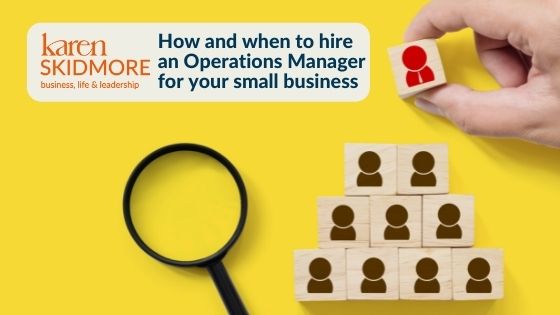Having a good Virtual Assistant (VA) to support you in your business is an essential first step to building your support team and releasing yourself from the trap of being a busy freelancer. Not only does a good VA free you up from day-to-day admin tasks, they also give you the opportunity to position yourself better; just as a lawyer, dentist or private doctor would have a receptionist or personal assistant to take care of enquiry forms, appointment booking and follow up documentation.
However, there is a stage in every business journey where you have to review whether you have the right team members to support your forward growth; not what you need right now, but what you need to go to the next level.
Your VA, no matter how good they are right now, may not be meeting what your business needs to level up. No fault of their own, but you, the business owner, haven’t got the time or energy to delegate effectively and important projects aren’t getting done.
You have reached capacity and you’ve taken on a freelancer mindset again, trying to do too much yourself. You have become the bottleneck in your business.
Has it become time to review who is in your support team and think about hiring an Operations Manager?
Over the years, we have helped many of our Momentum members shift their thinking and take the right action to up-skill their support teams. But last year, I could see that I needed to walk my own talk.
Although we had a great couple of years, especially as Melina Abbot joined me as a Senior Coach in my Momentum programme in 2018, in the second half of last year I saw that I had become a busy freelancer again. I had become that bottleneck in my business!
It was time for me to invest in my team, and one of the big lessons of now having gone through this process myself, is that I really should have done this six months earlier.
Alexia had already been working with me for 13+ years as my Virtual Assistant. Over the years, Alexia has grown in confidence on what projects she could take on and has been instrumental in creating robust and elegant onboarding processes and client management, which has hugely contributed to the success and retention of our Momentum membership. At the end of last year, I offered her the promotion of both upping her hours, and upping her level of responsibility and contribution to the business, and I am delighted she is now our Client & Operations Manager as of the start of February.
But when is the right time to hire an Operations Manager?
Should you be worried about the additional costs of hiring someone more than a VA? And do you really need an Ops Manager if all you want is a small, easy to run business?
Let’s dive in and answer these questions.
What is the difference between a VA and an Operations Manager?
The core difference is how strategic their role is. A VA typically takes instruction from you and is task driven; you decide on what tasks need doing and they do them for you. Of course there are plenty of VAs who take on project management and higher levels of responsibility, but not all VAs make for good Ops Managers.
An Ops Manager will typically manage the systemisation and scaling up of your business, as well making sure your business runs efficiently and effectively. They become accountable for outcomes and take a longer term approach to success, rather than just ‘getting stuff done’.
There are also Online Business Managers (OBM) who specialise in working on your digital strategy, marketing funnel systems and e-commerce processes. It really depends on what kind of business you are running so for the purposes of this article, I am including OBMs in this Ops Manager discussion.
When is the right time to hire an Operations Manager?
My answer to this question is always ‘three months from when you need them’.
The mistake I see so many business owners make is to leave hiring someone at this level too late. That was almost me. I had already laid down the intention to Alexia that I would love to hire her for more hours and increase her responsibility, but I spent the next six months with the mindset of ‘when XYZ happens, then I will be able to promote Alexia’.
It wasn’t until I saw how certain projects weren’t happening that I knew I had to flip this over to ‘when I promote Alexia, then XYZ will be able to happen’.
To see the real results from hiring someone at this level, you have to give yourself and them at least three months. Yes, someone can come in to fire-fight their way through certain projects, but these aren’t the best conditions for someone working strategically on your business. There is every chance they will burn themselves out focusing on task management and getting stuff done, and not have the space or energy for strategic thinking to make your business more efficient and effective and/or to up level.
Reviewing your business every quarter (or trimesterly planning as we do in Momentum) is critical to helping you see the opportune time. Here are a few red flags that you may recognise in your business right now:
- Your business development has stalled; you are too busy dealing with your current clients and the number of leads coming in are dropping.
- A number of ‘love to do’ projects have piled up because you haven’t had the time to plan out and execute them; projects such as that new podcast, or write that book or market yourself as a speaker.
- Your VA has started to irritate you; they were wonderful to begin with but now you’ve grown and the business is busier, you wish they would be able to use their initiative and come to you with solutions, rather than more questions for you to find the time to answer.
- Your VA can’t cope with the marketing funnels or digital course platforms you’ve created over the past year; they are doing their best to do what you ask, but it’s becoming clear that although they’ve been good at building what you need from the ground up, the systems and processes aren’t integrated and your business is feeling over-complicated and messy.
- You are spending too much of your time looking for documents, passwords or emails from key clients; you’ve even realised that several of your clients haven’t paid you but you’ve been too busy to chase them.
Now, of course, these red flags could mean all sorts of things; not just that you need an Operations Manager. But what you need to realise is how important it is for you to be thinking ahead and plan, hire and on board someone at this level BEFORE you get so busy fire-fighting that it makes it very difficult for you to have the time to go through this process.
Longer term thinking is needed and by deciding what you feel you need in your business one year from now, you will allow yourself to proactively plan ahead and avoid any of the red flags listed above.
How do you deal with the additional cost?
This one is a real doozy! Yes, it is a risk hiring someone that may double or even triple your current team costs, but here’s another way of asking this question …
How can you afford to not up-skill your support team?
If you need to motivate yourself, work out how much all those red flags above could cost you each month. And not just in lost revenue. There’s also the cost to your health and family if you are working more hours and stress than you can cope with right now.
To avoid getting stuck with this question, work out the cost of the first three months of hiring, and only look at this figure.
If you work out annual costs, and then look at your current revenue, it could be super scary. You have to remember that one of the key reasons for hiring someone at this level is that you are looking to grow and scale. If you are not freeing up your time to create opportunities to increase your revenue, then it may not be the right move for you (see below my answer to ‘Do I really need an Ops Manager?’).
Know the cost of those first three months – their initial probation period – as this is your core financial risk. If the person you’ve hired does not meet your expectations or deliver on what it is you want from them, then let them go. Don’t keep them on and pay any more in the hope that they ‘make good’ eventually. This way, you’ve only spent three months of fees, you’ve reduced your long term spending risk, and still probably gained a whole load of leadership lessons (which we could argue could be worth the money spent!).
Do you hire them on payroll or as a contractor?
First off, this is a legal question and needs to be addressed according to which country you are based. Here in the UK, we do have strict IR35 rules (I’d recommend you read them all through here on the gov.uk website).
As a basic rule of thumb, if you stipulate certain hours and days that need to be worked (ie Tuesday to Thursday 9 to 5) and you are their majority source of income, you are legally obliged to have them on payroll. And there is nothing scary about putting someone on payroll. I hired a part time Marketing Assistant many years ago on payroll and it was super simple as my accountant ran the payroll and I used all the legal contracts needed from Suzanne Dibble’s amazing Small Business Legal Academy.
If you are one of several clients they work with and you don’t stipulate hours, hiring them as a contractor/freelancer may give you a more flexible or easier option to get going with. Discuss this with the person you want to hire as they will be able to help with this if they are already working in this capacity with other clients.
Can I just give my current VA more responsibility?
Absolutely, but ensure you take the time to plan out exactly who you need and what responsibility you want them to take on. Although you may not need to do a formal interview process, you do need to talk through the new role and ensure they have the skills and qualities to fulfil your expectations.
Don’t just take the easy route and assume they can level up. Maybe you need to invest in their training and development if you feel they are the right fit for your business, but they currently lack the necessary skills. It’s often cheaper to invest in the people you have because of their knowledge of how your business runs and what your clients expect from you, then it is to try to buy in the new skills. So do consider this as an option.
Do you really need an Ops Manager when all you ever wanted was a small, easy to run business?
If your business is still under the VAT threshold or your revenue is running less than an average £5K/month, then a VA with a focus on systems and processes may be all that you will ever need. You don’t want to be ego-driven in this process, thinking that having an Ops Manager is what a successful business “should” have.
You don’t want to be over-resourcing your business and have unnecessary team costs eating into your profits, so understanding what your longer term growth strategy is important here. Scaling for the sake of scaling can unnecessarily over-complicate your business and end up being exhausting and expensive!
If your business is heading towards or already well into 6-figures, then investing in someone at the Ops Manager level can pay dividends, especially if you want a small, easy to run business.
So the real answer to this question is ‘it depends’; it depends on your ambitions, your life goals and how much time, freedom and energy you want in your life.
I believe your business is there to serve your life and leadership goals (rather than for us to be chasing business goals and getting trapped in a business that keeps us busy for the sake of being busy!). These are the kinds of decisions we help our Momentum members with regularly, so if this longer term strategic thinking is the kind of support you know you want for your business, then get in touch and we can talk through your options.
How do I go about hiring an Ops Manager?
There are several steps you have to follow to ensure a successful hiring process and long term relationship.
1. Write a job specification; what do you need them to do, what qualities does the person need to have, what are the opportunities you are can offer them
2. Go through a proper hiring process; don’t just hire friends or relatives, but nor do you have to use a recruitment agency. Use your current network, LinkedIn and even your current VA to help you spread the word. Set up interviews, including practical assessments if that is needed to give you the evidence that they are as good as they say they are. And remember references or ask to speak to some of their current clients.
3. Have contracts & service level agreements in place; again, I use Suzanne Dibble’s SBLA for all these. Don’t hire someone – payroll or contract – without the necessary paperwork and have it all confirmed BEFORE you begin working together.
4. Set them up for success; have a growth plan for them to work from, set out clear success metrics that they know they need to work towards to get the results you expect, and establish a plan for how you are going to communicate each week. These need to be done in partnership because this is how you start to wean yourself off the ‘I have to be in control of everything’ and allow them to do the job that you’ve hired them to do.
5. Review meetings; to ensure you are delegating (and not abdicating!) have a weekly Monday project meeting, a higher level monthly review meeting and an end of probation review to decide on your ongoing relationship.
6. Document, document, document; this should be second nature to a good Ops Manager, but make sure everything you both decide and take action on is documented. This is not only good practice for your whole business, but if you ever have to go through the hiring process again, you are not starting from scratch.
What other questions do you have?
Is there anything else you feel you need to do before you begin the process of hiring an Ops Manager?
It is easy to get caught up with all the ‘how do I?’ questions and then not take any action. The truth is that hiring an Ops Manager is just like anything we do successfully in business; it’s 80% mindset and 20% practicalities. In our Momentum programme, we go through in detail the steps and give you the confidence and support you need to ensure you hire right first time, so if this is something you know you want, check out our programme here.
I know I couldn’t have done what I have done in my business without my small, but very beautiful team. And I have always felt it to be important that they are invested in my business and in the success of my clients, as much as I am. So if you are sitting on the fence of whether you are ready to up-skill your support team, I encourage you to take the first step; write that job spec and then start having a few conversations.
Let me know in the comments below how this article has helped you.








